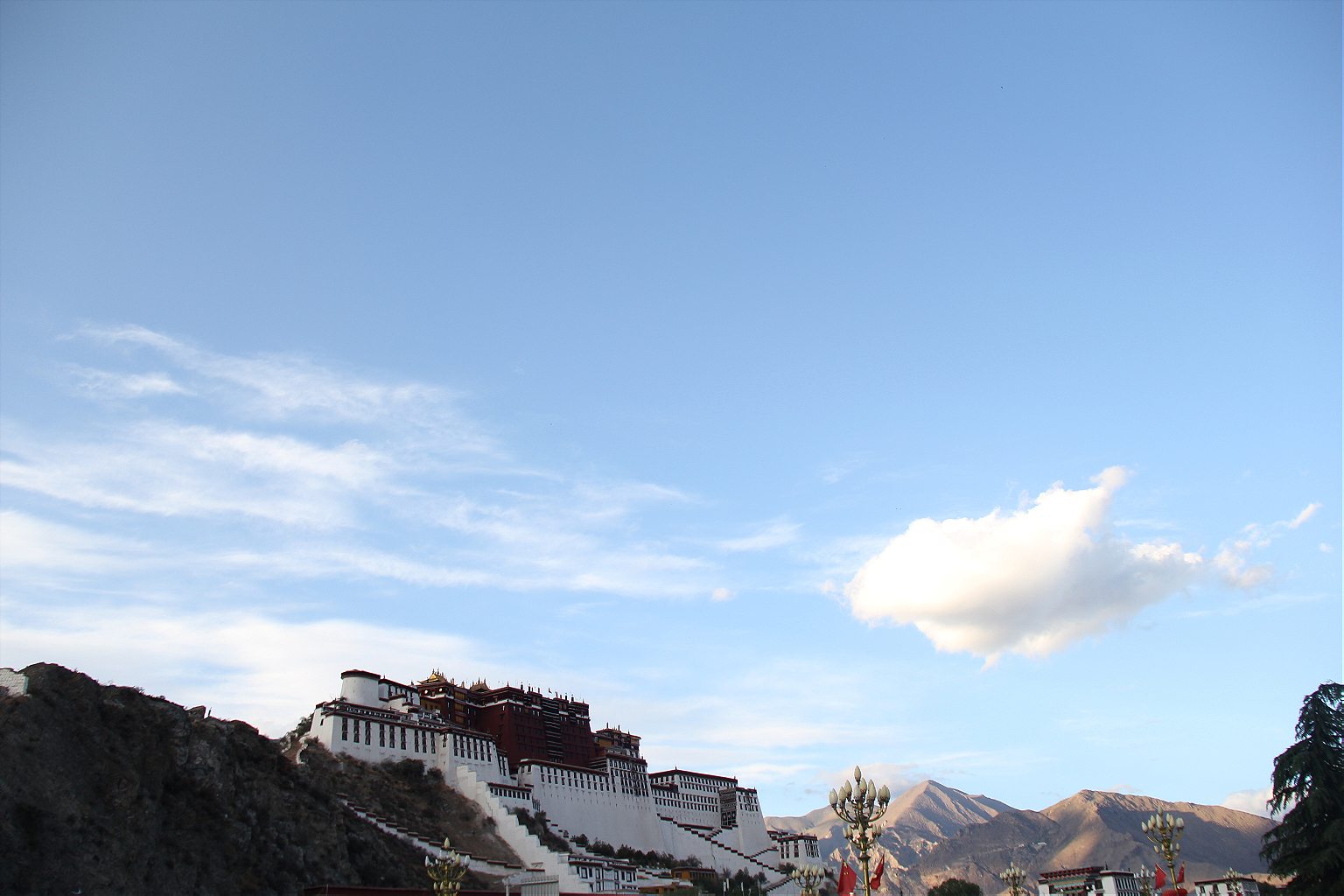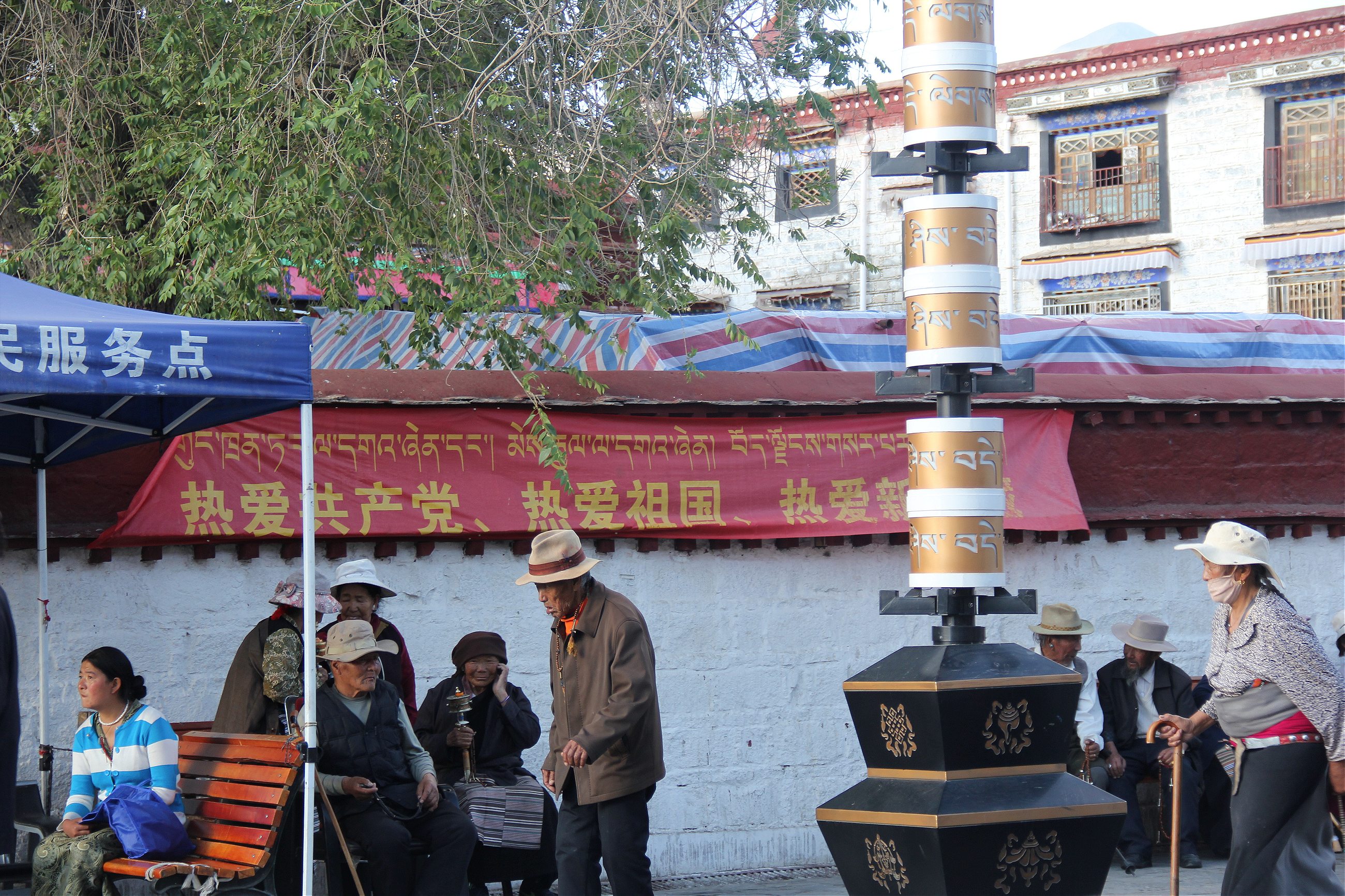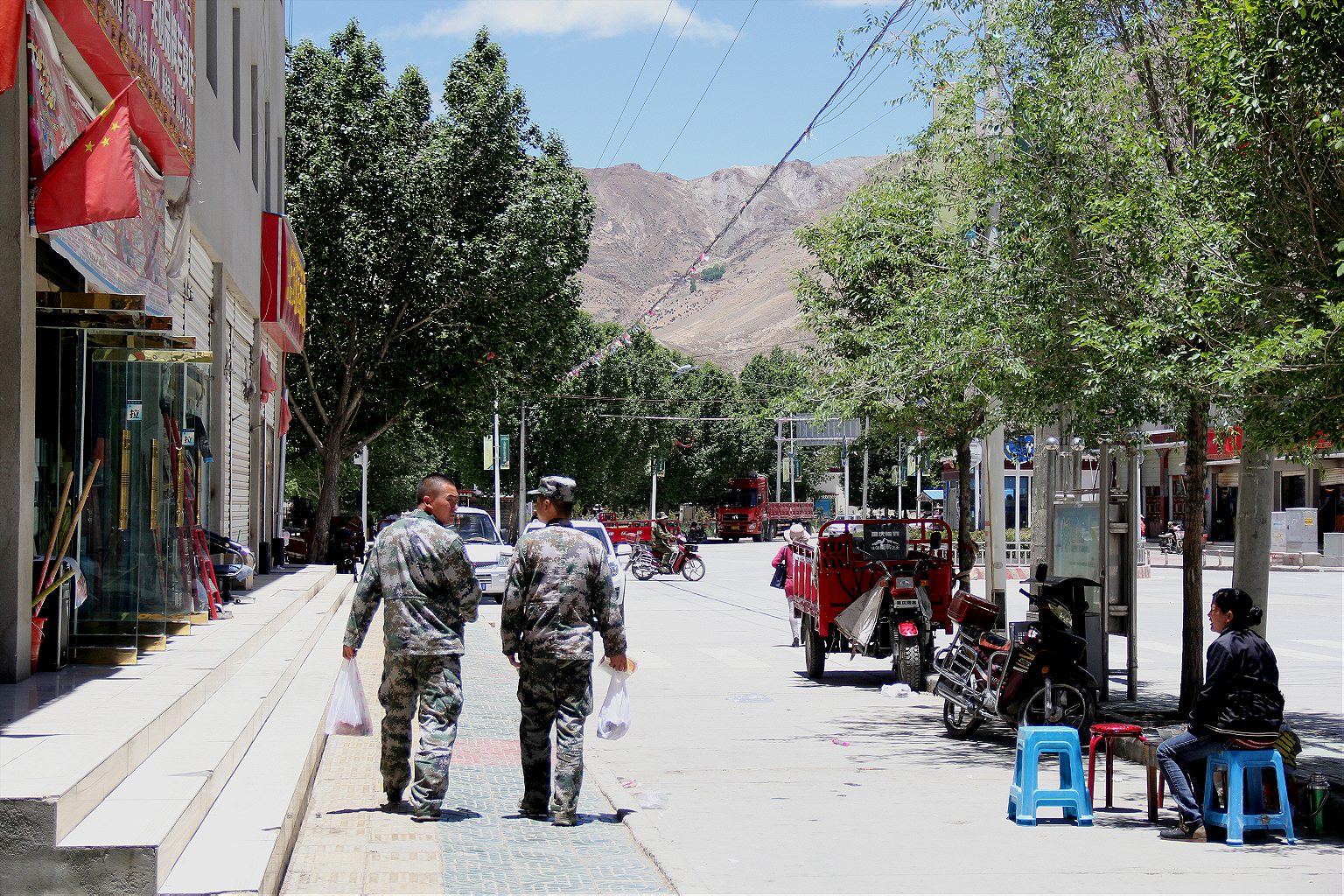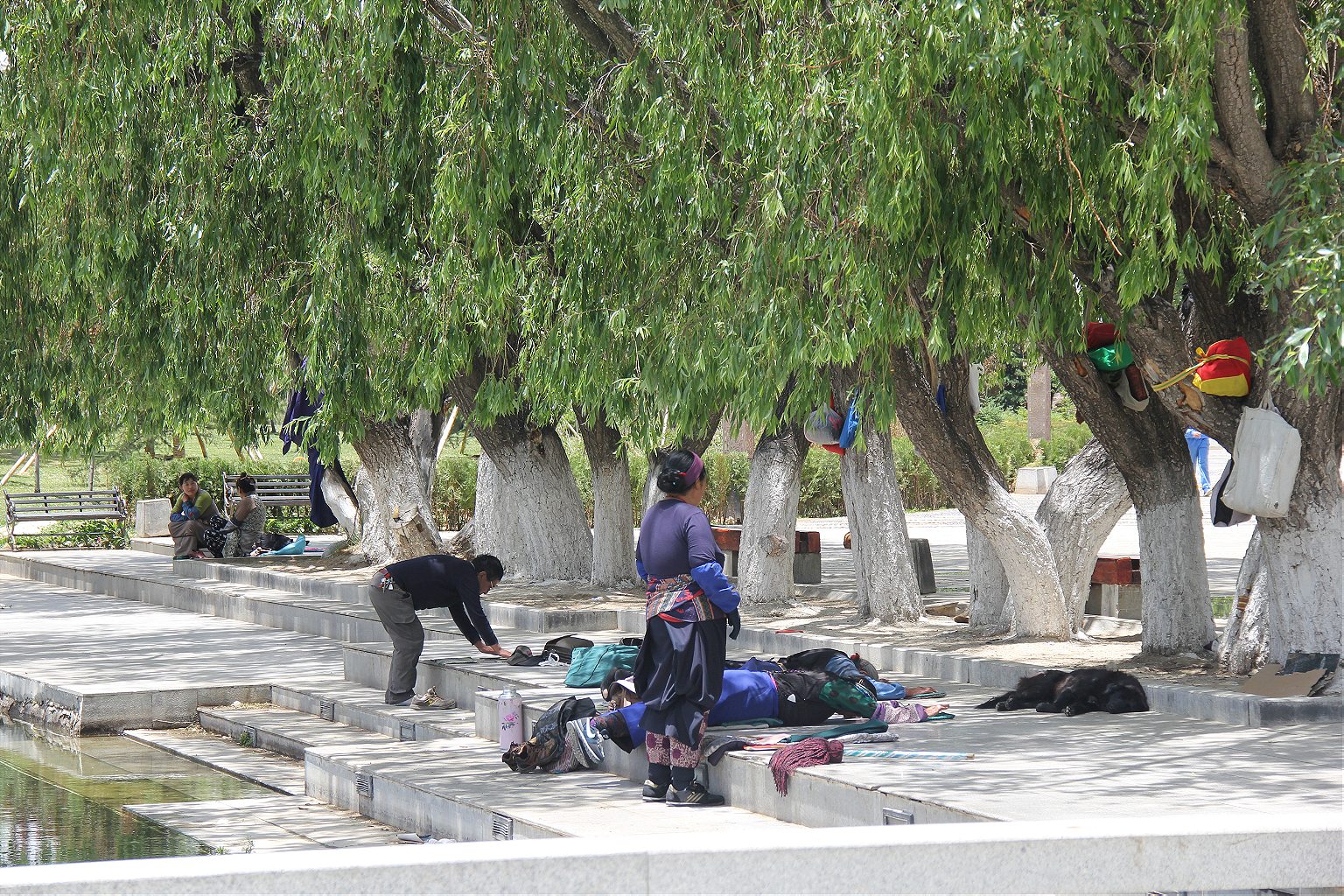A young Chinese writer examines her prejudices about Tibet.
In the early spring of 2008, 10-year-old Chen Tian was in Lhasa, Tibet, with his parents. They were originally from Gansu province in China, and sold fruit in the street outside the Jokhang Temple. “We were home that afternoon, on the fourth floor, when we heard people shouting outside saying: ‘They went crazy, they are killing people.’” Outside, they saw smoke.
I was in school on that day. The girl who sat next to me got news alerts on her phone. “Something happened in Tibet,” she said. “People were killed.” We talked about it until our class monitor shut us up: We had the College Entrance Examination in three months. But I kept wondering: How could such a thing happen in Tibet? We were taught that it was a beautiful land where the people enjoy freedom and happiness after the Chinese Communist Party ended the cruelty of slavery.
The news reports didn’t clear anything up. The anchors condemned the “violent and cruel actions of the separatists led by Dalai group,” but they never explained what the “Dalai Group” was, or what they wanted. Nobody really wanted to explain it to me, so I stopped asking questions and resolved to visit Tibet and answer them for myself. Seven years later, I finally took the trip.

On my first morning in Lhasa, after a 40-hour train journey and a night in a hostel near Potala Palace, I wake up to the sound of People’s Liberation Army soldiers chanting in a neighboring yard. Out on the street, the sky is blue and the clouds hang low. It’s beautiful, but my mind keeps wandering to the events of 2008. On March 14th that year, a series of riots and protests happened in Tibet’s capital city of Lhasa, and later spread to other Tibetan areas. They left 18 people dead and more than 380 injured, according to the Chinese government. On the square outside Potala Palace, I met Chen, who remembered those events clearly.
Chen, who is now 17, works as a plainclothes guard on the Potala Palace Square. He is strolling in the square dressed like a tourist, with a leather hat on his head and a backpack on his shoulder. We make eye contact. I find him strange, walking from one corner of the square to another, and he must feel the same about me. We get chatting, and I ask about 2008. “This city hasn’t recovered from the aftermath, although it looks peaceful on the surface,” Chen says.
I could see. Three months before the 50th anniversary of the founding of the Tibet Autonomous Region, Lhasa still shows its scars. There are policemen and People’s Liberation Army soldiers on duty everywhere you go.

Before long, one of Chen’s colleagues tries to stop our conversation from the other side of the street. I ask him one last question: “How do you feel about the unrest in Tibet?” Chen admits that although there is tension, he isn’t very worried, because he grew up here. “Most Tibetans are nice to me. But if I were sent to Xinjiang to be a guard, I would be freaked out. The people there can be crazy.”
Chen’s answer makes me very uncomfortable, but I don’t say anything. I know that’s what many people in China think. People will casually say “Tibetans are wild,” or “Mongolians are always drunk,” or “Manchurians are barbarians.” It’s not rare to hear people discriminate against Xinjiang and Uighur people. By the time Chen has branded an entire region of people “crazy,” I was tired of arguing. I had already heard so many things that made me feel uncomfortable during my journey to Tibet.
I’d heard these things on the train to Lhasa. As we passed a lake, another passenger, a Tibetan civil servant named Dan Zeng, said that it reminded him of Yanghu Lake in the Shannan area of Tibet, which is sacred, especially in the year of sheep when Tibetans traditionally walk around lakes to make wishes. “Local Tibetan people are saying that the water level has dropped after a hydroelectric power station was built on the lake,” he said. “The tenth Banchan Lama was strongly against the project, because in our culture every mountain and every lake has its God. We don’t want to change landscape. But the project was carried out anyway.”
A Han Chinese man named Zheng, an engineer from a government-owned construction company in Lhasa, interjected: “The local people should be filled with gratitude, shouldn’t they?” he said. “Dan Zeng, you tell me, isn’t a more convenient and modern life more important than the water level? You can’t have both sometimes,” Zheng continued. “Don’t be a hypocrite who enjoys the benefits and then turns his head to complain a minute later.”
Zheng later said: “Our policy in Tibet is like boiling frogs in water that gets heated up little-by-little. Before they know it they are doomed: It’s too late. Our policy towards Xinjiang is to use violence to fight violence.” I turned to look out of the window at the grassland, grazing yaks, and the occasional small house decorated with colorful prayer flags.

I thought about the fact that Zheng had used the term “our policy” instead of “the government’s policy.” He was not the only Han Chinese I met on the trip who would equate themselves with the government: “Tibetan troops back then were too weak, of course they were defeated by our troops”; “We should popularize Chinese language education in Tibet, I am shocked how many people here can not understand Chinese.” But when these people criticized the Chinese government, they referred to the government as “they.”
As a Han Chinese woman who grew up in a coastal city in east China, where most other people are Han, I could understand why. At school, Tibet and Xinjiang were referred to as strange and exotic places. The people who live there were simplistically portrayed as good at singing and dancing. Objectifying and idealizing Tibetan people makes it easier to avoid thornier issues like history and politics.
This isn’t just the official line: People frequently censor themselves. I still remember the first time I heard stories about Tibet. It was the winter of 1998, my family just moved into a hutong house in the Tianjin suburb of Lutai. The first evening in the house, our new neighbor Lao Chen (Old Chen) and his wife came to introduce themselves. We had dinner together. Sitting by the stove, after a few cups of baijiu, Lao Chen started to talk about his years in Tibet during Chairman Mao’s “Up into the mountains and down to the countryside” campaign of the 1960s.
“It was a deserted land, but beautiful,” Lao Chen said, in a strong Tianjin accent. “The people there didn’t burn dead bodies like we did, instead, they threw the bodies into the mountains for the eagles.” The more Lao Chen drank, the more he talked: “It was not always peaceful, there was blood in Tibet of course, you can hardly imagine. When the tanks rolled into Lhasa…” Once he started using words like “blood,” “tanks” and “suppression,” his wife got agitated. She shouted: “Go home, you crazy old man. You’ve had too much to drink, and you’ve scared the girl.” I thought about Lao Chen more than once during my time in Tibet. Lao Chen had seemed much less surprised about the events of 2008 than most people.

I first started examining my own prejudices during a trip to Kashgar, a city in Xinjiang. I was travelling with a foreign friend. On the train ride there, we heard about a killing in a nearby village. I told my friend to protect me if anything bad happened: “I think they will be more friendly to you than to me.” Then, during a drive to Pamir Plateau, our Uighur driver stopped suddenly in the middle of nowhere and took a mat out of the trunk and disappeared. I was terrified.
A million horrible possibilities went through my head as I texted my family the license plate number. Then I realized he’d just stopped to point the mat in the direction of Mecca and pray. Despite all that, I stayed suspicious until I got to a night market. The old people there were friendly, offering slices of melon and refusing to take any money. They made me feel so ashamed. I started to think about how little I really knew about this place and its people.
On a beautiful afternoon, Bianba Ciren, a Tibetan guide, and I walk down Bakuojie Street.
Chinese tourists pack the row of shops. They are more interested in Nepalese clothes and accessories than Tibetan ones, and most of the Nepalese merchandise is being sold by Han Chinese. When I ask Bianba why, he tells me: “The most obvious reason is: We are not given passports and cannot travel as freely as you. Some Tibetans, if they really want to do business, they have to find a Han Chinese partner who can travel easily.”
Bianba would really like a passport. “I don’t have any political reasons to travel. I just want to do business. In the past, when there were fewer limitations on foreign travelers to Tibet, it was much easier for me as an English-speaking guide. Now with fewer foreign tourists, I see being a guide is not something that I can do forever, and I see business opportunities like importing beads from India and Nepal.” But he can’t without a passport.

I originally met Bianba in the Potala Palace, where he works. Pilgrims were squeezed into a narrow passage, pointing to statues of the Dalai Lama in different lives, dropping money into boxes, and asking Bianba questions. As the pilgrims clogged the passageway, a Chinese fireman in an orange uniform yelled, “Everybody stand in a line.” But no one moved. The fireman started to look irritated, and shouted, “Can’t you just be quiet and walk in a line?” This time the crowd looked at him in confusion. Bianba, the guide, stepped in, telling the fireman, “They are Tibetans from villages, they don’t speak Chinese.” Then he turned back to the group and translated what the fireman said into Tibetan.
The next day, at an exhibition of porcelain at the Tibet Museum, a Chinese guide told a group of tourists from Shanghai: “Seeing these, you will be proud of being Chinese, and be convinced that Tibet had always been a part of China. Look at those tributes Tibetan kings gave to Chinese emperors and the porcelains Chinese emperors gave to Tibetan kings.” Outside there were red banners emblazoned with slogans: “No Chinese Communist Party, No New Prosperous Tibet.”